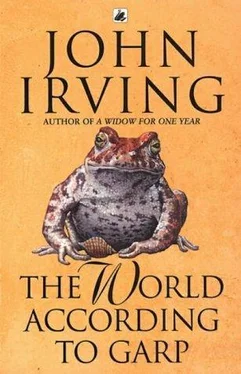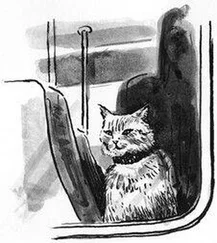God knows what happened to Pooh.
Helen and Garp fixed up the old Steering mansion, as it was called by many in the school community. The name Percy faded fast; in most memories, now, Midge was always referred to as Midge Steering. Garp's new home was the classiest place on or near the Steering campus, and when the Steering students gave guided tours of the campus to parents, and to prospective Steering students, they rarely said, “And this is where T. S. Garp, the writer, lives. It was the original Steering family house, circa 1781.” The students were more playful than that; what they usually said was, “And this is where our wrestling coach lives.” And the parents would look at one another politely, and the prospective student would ask, “Is wrestling a big sport at Steering?”
Very soon, Garp thought, Duncan would be a Steering student; it was an unembarrassed pleasure that Garp looked forward to. He missed Duncan's presence in the wrestling room, but he was happy that the boy had found his place: the swimmin pool—where either his nature or his eyesight, or both, felt completely comfortable. Duncan sometimes visited the wrestling room, swaddled in towels and shivering from the pool; he sat on the soft mats under one of the blow heaters, getting warm.
“How you doing?” Garp would ask him. “You're not wet, are you? Don't drip on the mat, okay?”
“No, I won't,” Duncan would say. “I'm just fine.”
More frequently, Helen visited the wrestling room. She was reading everything again, and she would come to the wrestling room to read—"like reading in a sauna,” she often said—occasionally looking up from what she was reading when there was an unusually loud slam or a cry of pain. The only thing that had ever been hard for Helen, about reading in a wrestling room, was that her glasses kept fogging up.
“Are we already middle-aged?” Helen asked Garp one night in their beautiful house, from the front parlor of which, on a clear night, they could see the window squares of light in the Jenny Fields Infirmary; and look over the green-black lawn to the solitary night light above the door of the infirmary annex—far away—where Garp had lived as a child.
“Jesus,” Garp said. “Middle-aged? We are already retired —that's what we are. We skipped middle age altogether and moved directly into the world of the elderly .”
“Does that depress you?” Helen asked him, cautious.
“Not yet,” Garp said. “When it starts to depress me, I'll do something else. Or I'll do something , anyway. I figure, Helen, that we got a head start on everyone else. We can afford to take a long time-out.”
Helen grew tired of Garp's wrestling terminology, but she had grown up with it, after all; it was water off a duck, for Helen Holm. And although Garp wasn't writing, he seemed, to Helen, to be happy. Helen read in the evenings, and Garp watched TV.
Garp's work had developed a curious reputation, not altogether unlike what he would have wanted for himself, and even stranger than John Wolf had imagined. Although it embarrassed Garp and John Wolf to see how politically The World According to Bensenhaver was both admired and despised, the book's reputation had caused readers, even if for the wrong reasons, to return to Garp's earlier work. Garp politely refused invitations to speak at colleges, where he was wanted to represent one side or another of so-called women's issues; also, to speak on his relationship to his mother and her work, and the “sex roles” he ascribed to various characters in his books. “The destruction of art by sociology and psychoanalysis,” he called it. But there were an almost equal number of invitations for him simply to read from his own fiction; an occasional one or two of these—especially if it was somewhere Helen wanted to go—he accepted.
Garp was happy with Helen. He wasn't unfaithful to her, anymore; that thought seldom occurred to him. It was perhaps his contact with Ellen James that finally cured him of ever looking at young girls in that way. As for other women—Helen's age, and older—Garp exercised a willpower that was not especially difficult for him. Enough of his life had been influenced by lust.
Ellen James, who was eleven when she was raped and untongued, was nineteen when she moved in with the Garps. She was immediately an older sister to Duncan, and a fellow member of the maimed society to which Duncan shyly belonged. They were so close. She helped Duncan with his homework, because Ellen James was very good at reading and writing. Duncan interested Ellen in swimming, and in photography. Garp built them a darkroom in the Steering mansion, and they spent hours in the dark, developing and developing—Duncan's ceaseless babble, concerning lens openings and light, and the wordless oooh's and aaah's of Ellen James.
Helen bought them a movie camera, and Ellen and Duncan wrote a screenplay together and acted in their own movie—the story of a blind prince whose vision is partially restored by kissing a young cleaning woman. Only one of the prince's eyes is restored to sight because the cleaning woman allows the prince only to kiss her on the cheek. She is embarrassed to let anyone kiss her on the lips because she has lost her tongue. Despite their handicaps, and their compromises, the young couple marries. The involved story is told through pantomime and subtitles, which Ellen wrote. The best thing about the film, Duncan would say later, is that it's only seven minutes long.
Ellen James was also a great help to Helen with baby Jenny. Ellen and Duncan were expert baby-sitters with the girl, whom Garp took to the wrestling room on Sunday afternoons; there, he claimed, she would learn to walk and run and fall without hurting herself, although Helen claimed that the mat would give the child the misconception that the world underfoot felt like a barely firm sponge.
“But that is what the world does feel like,” Garp said.
Since he had stopped writing, the only ongoing friction in Garp's life concerned his relationship with his best friend, Roberta Muldoon. But Roberta was not the source of the friction. When Jenny Fields was dead and gone, Garp discovered that her estate was tremendous, and that Jenny, as if to plague her son, had designated him to be the executor of her last wishes for her fabulous loot and the mansion for wounded women at Dog's Head Harbor.
“Why me? ” Garp had howled. “Why not you? ” Garp yelled at Roberta. But Roberta Muldoon was rather hurt that it hadn't been her.
“I can't imagine. Why you, indeed?” Roberta admitted. “Of all people.”
“Mom was out to get me,” Garp decided.
“Or she was out to make you think ,” Roberta suggested. “What a good mother she was!”
“Oh boy,” Garp said.
For weeks he puzzled over the single sentence that stated Jenny's intentions for the spending of her money and the use of her enormous seacoast house.
I want to leave a place where worthy women can go to collect themselves and just be themselves, by themselves.
“Oh boy,” Garp said.
“A kind of foundation?” Roberta guessed.
“The Fields Foundation,” Garp suggested.
“That's terrific!” Roberta said. “Yes, grants for women—and a place to go.”
“To go do what? ” Garp said. “And grants for what?”
“To go get well, if they have to, or to go be by themselves, if that's what they need,” Roberta said. “And to write, if that's what they do—or paint.”
“Or a home for unwed mothers?” Garp said. “A grant for “getting well"? Oh boy.”
“Be serious,” Roberta said. “This is important. Don't you see? She wanted you to understand the need, she wanted you to have to deal with the problems.”
Читать дальше












